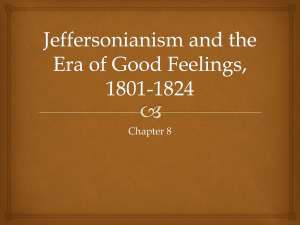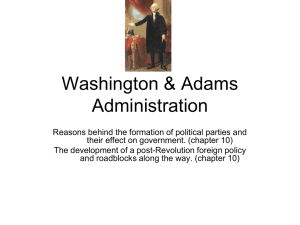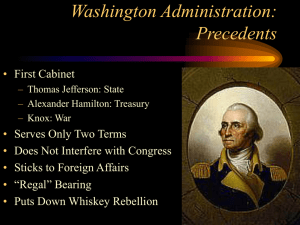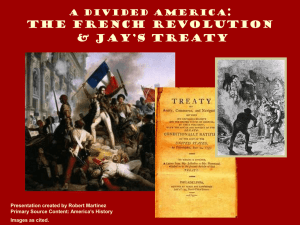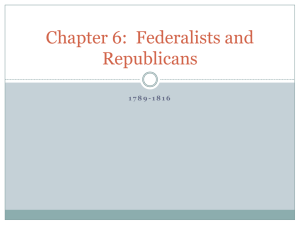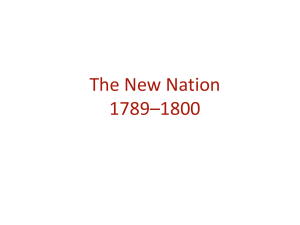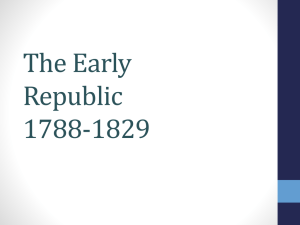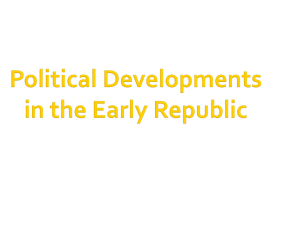The New Republic
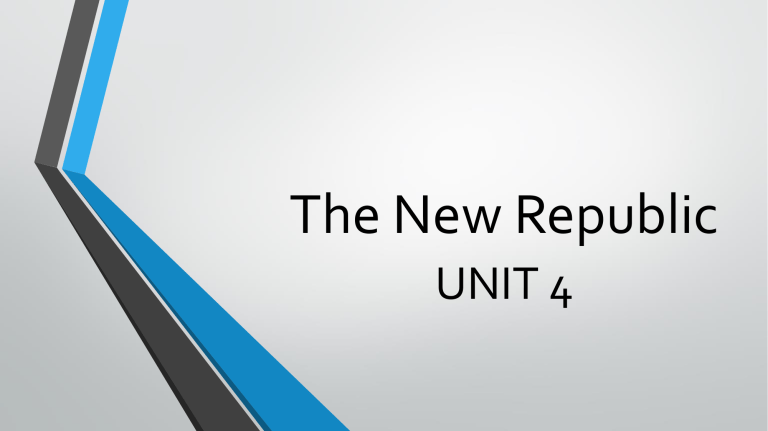
The New Republic
UNIT 4
A New Nation
Chapter 8, Section 1
Vocabulary
Precedent Cabinet
National Debt Bond
Speculator
Unconstitutional
Tariff
Important Actions in Washington’s First Term
Actions by Washington Actions by Congress
1. 1.
2. 2.
3.
4.
Important Actions in Washington’s First Term
Actions by Washington
1. Nominated the first Chief
Justice of the Supreme Court
Actions by Congress
1. Created the executive departments
(State, Treasury, War and Attorney
General)
2. Appointed department heads for his cabinet 2. Established a Federal Courts System
3. Approved the Bill of Rights
4. Created a National Bank
Hamilton and Jefferson, For and Against
HAMILTON JEFFERSON Issue
National Bank
Protective Tariffs
National Taxes
Hamilton and Jefferson, For and Against
Issue
National Bank
Protective Tariffs
National Taxes
HAMILTON
FOR
FOR
FOR
JEFFERSON
AGAINST
AGAINST
AGAINST
Reflection Questions
1.
What precedent did Washington establish for the Title of
Address for the president? Is this title of address still in use today?
2.
Name the first three executive departments, name their leaders, and duties.
3.
Name the two additional offices established by Congress during the summer of 1789.
4.
Describe the Judiciary Act of 1789.
Reflection Questions, Continue…..
5.
Who introduced the Bill of Rights and when were they added to the Constitution?
6.
What is the “National Debt” and what Hamilton’s plan for the debt?
7.
Why did Hamilton’s plan cause such a storm of protest?
8.
How did Hamilton finally compromise to settle the matter?
9.
Why was the idea of a National Bank viewed as unconstitutional?
Discussion Question 8.1
•
Hamilton said about Washington, “He consulted much, pondered much, resolved slowly, and resolved surely.” Did this make
Washington a good first president.
•
Answer this question and explain your reasoning, using examples from the reading, in an MLA formatted essay of no more than 125 words.
Notes Quiz 8.1
1.
Why did Hamilton’s plan for the payment of the national debt cause such a storm of protest?
2.
Describe the Judiciary Act of 1789. (include the inference information pertaining to why the two numbers were significant)
Early Challenges
Chapter 8, Section 2
Vocabulary
1.
Neutrality
2.
Impressment
Early Republic’s Governmental Actions
Results Governmental Action
Treaty of Greenville
Proclamation of Neutrality
Jay’s Treaty
Pinckney’s Treaty
Early Republic’s Governmental Actions
Governmental Action
Treaty of Greenville
Results
Native Americans gave up most lands in present say Ohio for Anglo Settlement
Proclamation of Neutrality
Jay’s Treaty
Pinckney’s Treaty
Prohibited Americans from fighting in war between France and England
British agreed to withdrawal from American soil
Gave Americans free navigation of the
Mississippi River
Cause and Effect of the Whiskey Rebellion
The Whiskey
Rebellion
Cause and Effect of the Whiskey Rebellion
Farmers resistance to a tax imposed on whiskey
The Whiskey
Rebellion a. 500 people riot b. Gov’t Used
Force c. People realize laws must be changed peacefully
Discussion Question 8.2
1.
What message was President
Washington sending to the American people when he ordered that force be used to stop the Whiskey
Rebellion?
2.
MLA format, about 100 words
Reflection Questions
1.
How did the Whiskey Rebellion affect the way government handled protesters?
2.
What message was Washington sending to the American people when he used force to stop the Whiskey Rebellion?
3.
What did Native American groups do to fight more effectively in the Northwest?
4.
Why did many Americans protest Jay’s treaty?
5.
What was the impact of Washington’s farewell address?
The First Political Parties
Chapter 8, Section 3
1.
Partisan
2.
Implied Powers
3.
Caucus
4.
Alien
5.
Sedition
6.
Nullify
7.
States’ Rights
Vocabulary
Differences Between the Federalists and
Democratic-Republicans
Issue Federalists
Role of the Federal
Government
1.
2.
Democratic-
Republicans
1.
2.
3.
Differences Between the Federalists and
Democratic-Republicans
Issue Federalists
Role of the Federal
Government
1. Strong role for the Federal
Government
2. Loose interpretation of the Constitution
Democratic-
Republicans
1. Weak role for the
Federal
Government
2. Strong State
Governments
3. Strict interpretation of the
Constitution
Discussion Question 8.3
•
MLA Format
•
No More than 125 words
•
Do you think the development of political parties was necessary? Use examples from the reading
AND/OR current events to support your position.
The Jefferson Era, 1800 -
1816
Chapter 9
The Republicans Take
Power
Chapter 9, Section 1
Vocabulary
1.
Laissez-Faire
2.
Customs Duties
How did Jefferson and the new Republican government reduce the federal government?
Ways Federal government was reduced
How did Jefferson and the new Republican government reduce the federal government?
Allow Alien and Sedition
Acts to expire
Ways Federal government was reduced
Cut spending by the federal government
Repeal
Naturalization
Act
Reduce size of the army and navy
Repeal federal internal taxes
Appointment of “Midnight Judges”
President
Adams
Appoints
Judges
Appointment of “Midnight Judges”
President
Adams
Appoints
Judges
Jefferson tells
Madison not to send out the commissions that appoint the judges
Marbury, a judge, takes his case to the Supreme
Court to force delivery of the commission(s), setting up
Marbury v.
Madison
Reflection Questions
1.
What were the requirements of the 12 th Amendment?
2.
How did the changes that Jefferson made when he became president reflect his views about government?
3.
Explain how Jefferson cut government spending.
4.
How was the deadlock in the presidential election of 1800 finally resolved?
5.
Summarize the Supreme Court case that established
“Judicial Review.”
Notes Quiz 9.1
1.
Define laissez-faire, including its actual French meaning.
2.
Summarize the Supreme Court case that established “Judicial Review.”
The Louisiana Purchase
Chapter 9, Section 2
Vocabulary/People
1.
Conestoga Wagon
2.
Secede
3.
Lewis and Clark (full names and importance)
4.
Sacagawea
5.
Zebulon Pike
6.
Aaron Burr
Benefits of the Purchase of the Louisiana
Territory
Louisiana Territory
Benefits of the Purchase of the Louisiana
Territory
Louisiana Territory
Cheap and abundant land for farmers was available
Control of the entire
Mississippi
River
Acquisition of the Port of New
Orleans
Discussion Question 9.2
•
MLA Format
•
About 125 words
•
Why was the Louisiana Purchase important to Americans?
•
Address the following:
•
Benefit to the Nation
•
Benefit to farmers
•
Benefit to traders
Reflection Questions
1.
Why was the Mississippi River vital to western farmers?
2.
How was the United States threatened by the transfer of the Louisiana Territory from Spain to France?
3.
Why was France willing to sell the territory to the United
States?
4.
What was the significance of the Lewis and Clark expedition?
5.
What was the root cause of the duel between Hamilton and
Burr?
Notes Quiz 9.2
1.
What was the significance of the Lewis and Clark expedition?
2.
How was the United States threatened by the transfer of the Louisiana Territory from Spain to France?
A Time of Conflict
Chapter 9, Section 3
1.
Tribute
2.
Neutral Rights
3.
Impressment
4.
Embargo
5.
War Hawks
6.
Nationalism
Vocabulary
Demands for Tribute
Attack on the
Chesapeake
Tecumseh’s
Confederation
Cause and Effect
Actions of the
United
States 0f
America
Demands for Tribute
Attack on the
Chesapeake
Tecumseh’s
Confederation
Cause and Effect
Actions of the
United
States 0f
America
War with Tripoli
Embargo Act
Conflict with Native
Americans
1805
Time Line (Flow Map)
June 1807
December 1807 1809
Time Line (Flow Map)
1805 – The United States is neutral in war between
Britain and France
December 1807 – Embargo
Act is passed
June 1807 – Britain’s attack on the Chesapeake does not result in a war
1809 – Embargo Act is repealed and the
Nonintercourse Act is passed
Discussion Question 9.3
•
MLA Format
•
No more than 125 words
•
How did the conflict in Europe help the American shipping industry prosper?
The War of 1812
Chapter 9, Section 4
1.
Frigate
2.
Privateer
Vocabulary
Battle
Battles in the War of 1812
Outcome
Lake Erie
Washington, DC
New Orleans
Battle
Battles in the War of 1812
Outcome
Lake Erie
American forces under Perry destroyed the
British forces
Washington,
DC
British forces burned government buildings, including the White House
New Orleans
British forces were badly defeated by forces led by Andrew Jackson, a future president
Effects from the War of 1812
War of
1812
Effects from the War of 1812
The Federalist Party lost power
There was a new spirit of Nationalism in
America
War of
1812
America felt equal to other nations in the world
The War Hawks continued their efforts for a strong national government
Reflection Questions
1.
Why was the United States badly unprepared for war with Britain?
2.
Why was the victory by the Americans in the battle of Lake
Champlain important?
3.
What was the Treaty of Ghent and what issues did the treaty resolve?
4.
How did Andrew Jackson use his war record to help him win the presidency in 1828?
5.
How did Americans in the South and West differ with Americans in the North in their opinion about the war?
Notes Quiz 9.4
1.
What was the Treaty of Ghent and what issues did the treaty resolve?
2.
Why was the United States badly unprepared for war with Britain?
3.
Why was the victory by the Americans in the battle of Lake Champlain important?
Growth and Expansion
Chapter 10
Economic Growth
Chapter 10, Section 1
Vocabulary
1. Industrial Revolution 2. Capitalism
3. Capital 4. Free Enterprise
5. Technology 6. Cotton Gin
7. Patent 8. Factory System
9. Interchangeable Parts
Changes Brought on by the Industrial
Revolution
Industrial Revolution
Changes Brought on by the Industrial
Revolution
Industrial Revolution
Cities grew as people moved to work in factories and mills
The U.S. grew in wealth, power, and independence
Factory system allowed production to be daster and cheaper
Inventions allowed agriculture to expand
Benefits of the Free Enterprise System
Free
Enterprise
System
Benefits of the Free Enterprise System
Competition
Free
Enterprise
System
Profit
Private
Property
Economic
Freedom
Reflection Questions
1.
Why were the first mills in Great Britain built on or near rivers?
2.
Why was New England ideal for the development of factories?
3.
How did the factory system work?
4.
How was the Northeast different from the South in what it produced?
5.
How did the Cotton Gin affect cotton production?
6.
Why did cities such as Pittsburgh and Louisville grow?
Notes Quiz 10.1
1.
Why did cities such as Pittsburgh and Louisville grow?
2.
Why was New England ideal for the development of factories (4 reasons)?
3.
Who pioneered the use of interchangeable parts?
4.
What three inventions revolutionized the textile industry?
Westward Bound
Chapter 10, Section 2
I.
Census
II.
Turnpike
III.
Canal
IV.
Lock
Vocabulary
Important Elements in the Growth and
Development of the United States of America
Significance (Importance)
National Road
John Fitch
Erie Canal
Important Elements in the Growth and
Development of the United States of America
Significance (Importance)
National Road
John Fitch
Erie Canal
Connected areas of the Midwest to the East
Helped in the development of the steamboat
Linked New York City with the Great
Lakes region and inspired the building of other canals
Transportation Links
Then and Now
1.
2.
3.
4.
5.
TRANSPORTATION LINKS
FROM EAST TO WEST IN THE
EARLY 1800’s
1.
2.
3.
4.
5.
6.
MODERN TRANPORTATION
LINKS TO TODAY
Transportation Links
Then and Now
TRANSPORTATION LINKS
FROM EAST TO WEST IN THE
EARLY 1800’s
1. Roads
2. Canals
3. Steamboats and Barges
4. Wagons
5. Horseback
MODERN TRANPORTATION
LINKS TO TODAY
1. Roads
2. Motor Vehicles
3. Trains
4. Planes
5. Canals
6. Boats (Ships)
Reflection Questions 10.2
1.
Name a modern example of a turnpike in the Metroplex.
2.
What advantages did steamboat travel have over wagon and horse travel?
3.
What two cities did the Erie Canal connect?
4.
Describe the improvements in transportation in the westward expansion during the early 1800’s.
5.
How did better transportation affect westward expansion?
6.
What states were formed between 1791 and 1803?
Discussion Question 10.2
1.
MLA Format with “Works Cited” page and individual citation within the text of your essay.
2.
No more than 100 words
3.
How did canals improve travel on waterways?
Notes Quiz 10.2
1.
Explain a census. Include the definition, frequency, why it is required, and its purpose.
2.
List the states formed between 1791 and
1803.
Unity and Sectionalism
Chapter 10, Section 3
Vocabulary
1.
Sectionalism
2.
Internal Improvements
3.
American System
4.
Disarmament
5.
Demilitarize
6.
Court-Martial
Sectional Conflicts
•
List the Four Reasons for Sectional Conflict within the United
States:
•
A. _____________________________________________
•
B. _____________________________________________
•
C. _____________________________________________
•
D. _____________________________________________
Sectional Conflicts
•
List the Four Reasons for Sectional Conflict within the United
States:
•
A. ___Slavery____________________________________
•
B. ___Need for Tariffs_____________________________
•
C. ___National Bank______________________________
•
D. ___Internal Improvement such as roads and canals___
What are the Chain of Events in Latin American and
Europe that lead to the Monroe Doctrine?
The Monroe Doctrine
What are the Chain of Events in Latin American and
Europe that lead to the Monroe Doctrine?
Increased nationalism and self-confidence on the part of the United
States
Rebellions against Spanish rule in their colonies
Spain asked for help in its fight against revolutionaries
The Monroe Doctrine
Reflection Questions
1.
Why was the period following the War of 1812 known as the Era of Good
Feelings?
2.
Describe the disagreement between the North and the South that resulted in the Missouri Compromise.
3.
What issue did the Missouri Compromise address?
4.
How did Northern and Southern attitudes towards slavery differ?
5.
What action did Daniel Webster take that shows he placed his concerns for the nation above his sectional interests?
6.
Why was the Supreme Court’s decision in Gibbons v. Ogden significant?
7.
What areas did the United States obtain from Spain?
8.
How did the Monroe Doctrine affect foreign policy?
Notes Quiz 10.3
1.
Define the “American System.” Include the name of the author and at least two provisions of the system.
2.
Why was the Supreme Court’s decision in Gibbons v. Ogden significant?
3.
What is the difference between disarmament and demilitarization?
4.
Describe the disagreement between the North and the South that resulted in the Missouri Compromise.
5.
How did the Monroe Doctrine affect foreign policy?
Discussion Question 10.3
•
MLA format with works cited page required.
•
No more than 150 words.
•
Explain the Supreme Court decision in McCulloch v.
Maryland. Include the basics of the case and the final decision of the court. Why specifically was Maryland wrong in trying to tax the Second National Bank of the
United States?

